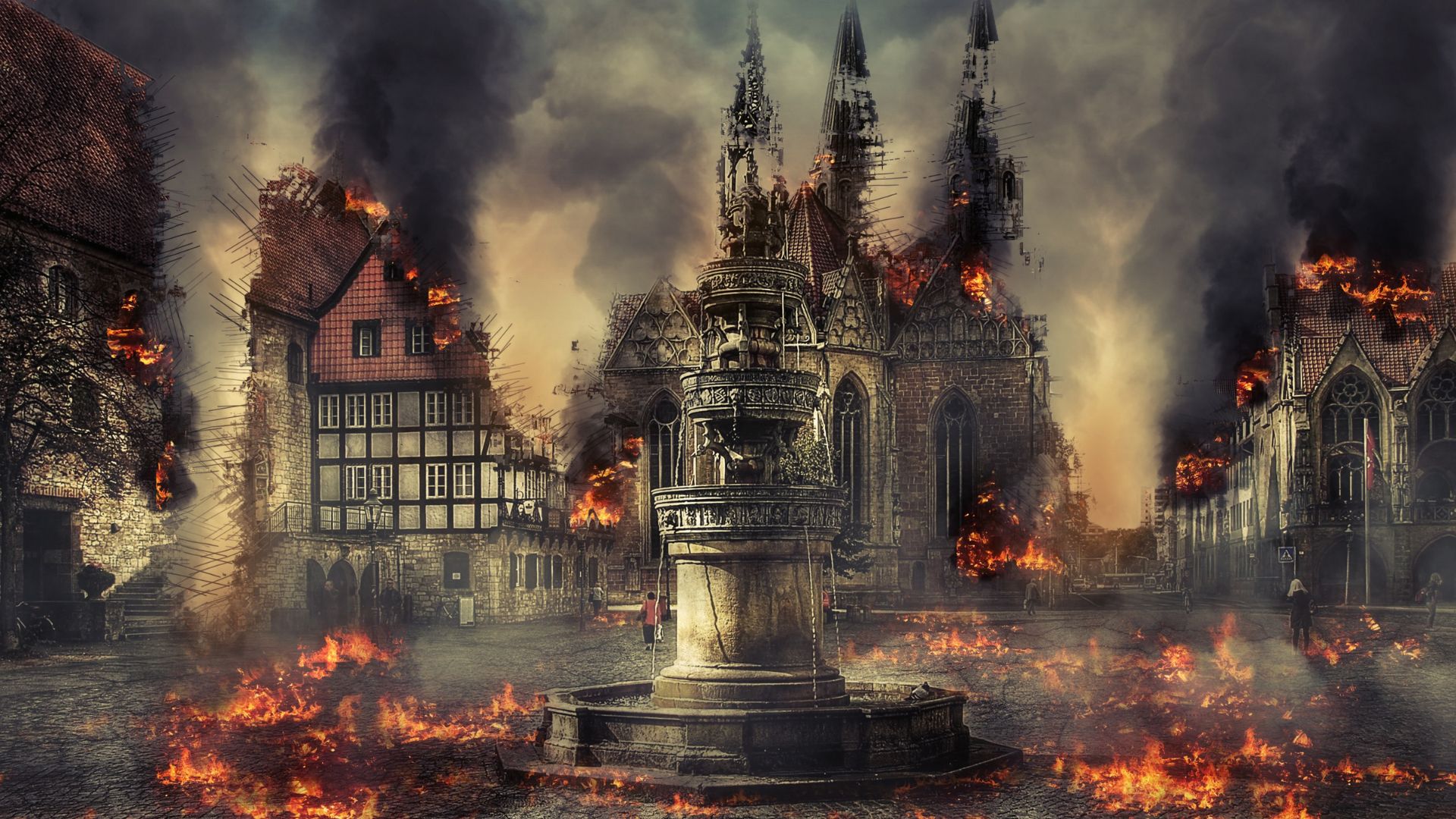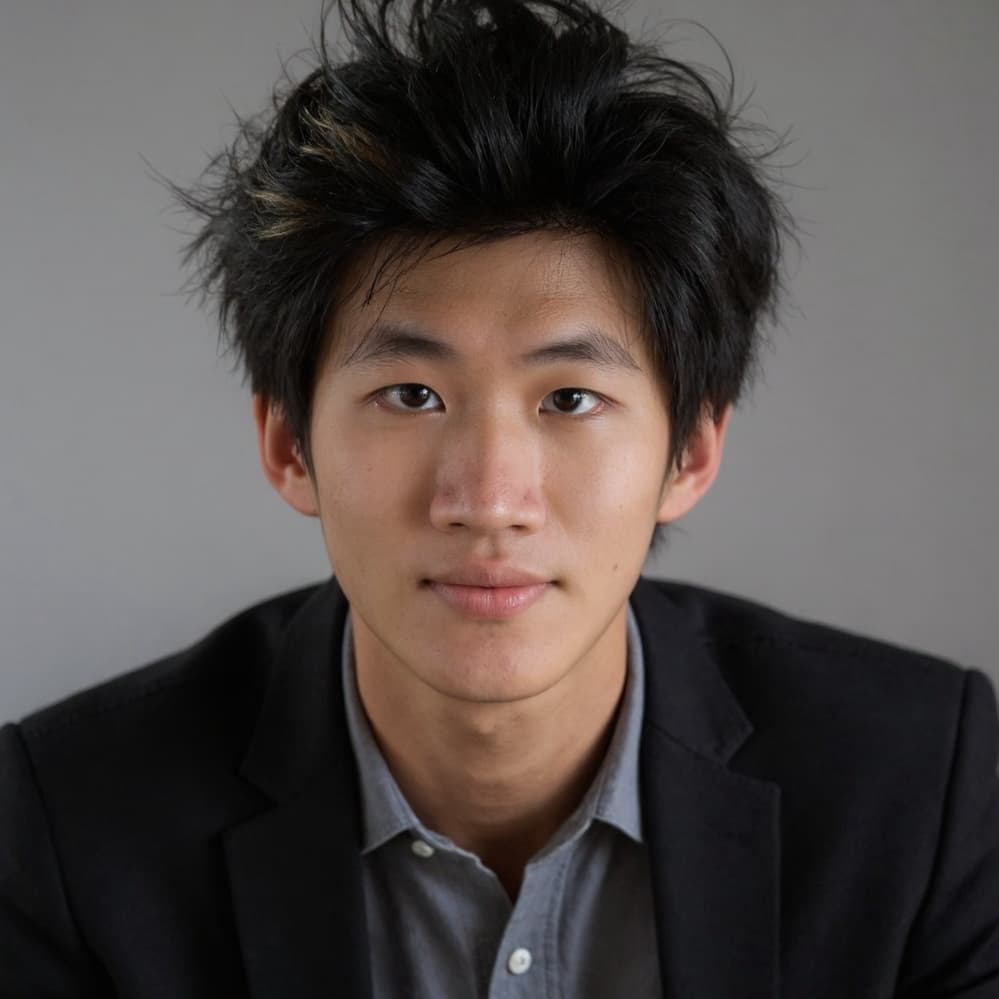The few intact bodies are buried in ash, under the scattered remains of their comrades, and perhaps their foes. In this way, at least, they are not alone.
But in the end, everybody is ashes.
As I look out on the dead landscape of drowning towers and scorched homes, I think, it’s really dust, isn’t it? Or dust is really ashes.
Death, expiry, extinguishment, eradication—it all ends the same way. Complex systems upon systems of life and organs and muscles and hearts… in the end, we’re all just dirt on the ground.
But where do the souls go?
I hear the dark-haired woman’s battle-worn boots crunch brittle bones along what was once a street.
Anastasia is her name; her sister once called her ‘Annie’.
Her sister does not speak anymore, and Anastasia is now is a lone ruler without her people.
For there is no life here.
A courtyard’s tree, where deep the ashes lie.
She hears forgotten glee—children chanting an old lullaby:
“Her eyes, they see a safe man home
From battles won and idols thrown
To seas and lands and fair young royals
Loving all through strife and toil.”
Anastasia’s feet crumble the stones of vacant homes that have been razed, pilfered and poisoned. Velvet chairs torn asunder spill their innards to the bloodied ground.
High above, burnt palace spires reach in vain for black skies, and ruined ramparts lean drunkenly against neighbouring battlements and bastions.
Malevolent spells probe Anastasia’s mind; they are the defences of this ruined city, enforced not by its rulers, but by its invaders. They pierce her memories, unforgiving in their vile reminiscence.
I watch Anastasia suffer. I feel her pain, as her mind is wrought with fear and despair. Her grisly remembrances are clear as day—or rather, as day used to be. They forcefully fill the space around her.
I have no eyelids to shut them out with. I must watch. I am naught but an observer: Anastasia’s silent companion.
That is the curse.
The palace fell first. A haven imploded.
“To the ramparts!” yelled the captain of the guard.
Anastasia pushed through the swarming crowd, making her way to the citadel’s bridge.
“Annie, wait!” said Helena desperately, grabbing Anastasia’s arm. “You can’t stop him! Let’s get the others and get out!”
Anastasia turned and looked at her sister fondly. “It is your job to look after your friends. And mine to protect this city. I shall see you on New Haven. Go, H, now!”
Helena watched as Anastasia hurried off, galvanising her forces to form ranks: “Offensive spell-casters and archers to the fore, shield-bearers behind! On my command—fire!”
Tears trickled down Helena’s cheeks. She stubbornly wiped them away, and ran in the opposite direction.
“There is no sanctuary, only hiding places.”
Anastasia says the words as though an unseen entity twists her voice and injects it with malice. She gasps and stumbles, an arm raised before her to ward off an invisible, insidious foe.
I want to help her, but I don’t know that I can. I am helpless, like everyone was, when all this happened.
The rings cracked, and magic died.
Anastasia looked up as screams pierced the air. The rings around the planet had shattered. High above the battle, cracks eagerly split through the magical rocks. Asteroids crossed the sky with fiery orange trails.
The Baron’s generals marched through the ruined streets as meteors smote the elven citadels of Lightfarthings with deafening shockwaves.
General Wheyspire raised her hand to the sky and directed a fiery asteroid to the north. Anastasia followed its path, and with a shocked realisation, cried out in despair.
The projectile struck the flying fortress of New Haven. Explosions shook the castle. It crumbled, lost altitude, and crashed into the cliffs.
“No,” whispered Anastasia.
Smoke and flame rose from the city’s last vessel of salvation.
The Baron and his generals laughed.
“No crown, no sword, no will or way.”
Anastasia hisses these words and stops walking, face contorted with pain.
There is a will, I say urgingly. While you’re alive, there is always a will, and always a way. That’s how it’s always been, Annie.
Anastasia lets out a sharp cry, her fingers pressed to her temples. The dark magic is palpable, smothering her like many coarse blankets.
She falls to her knees.
Chests were opened, doors were locked.
The people of Lightfarthings knew this was it. Some turned to their hoards of possessions. Others clutched their loved ones close, finding sullied seclusion and pitiful privacy where they could.
And still the knights fought. They fought for something they could not see, only feel. It was hope. The hope that this was only a fleeting darkness. That though the western glow of the great sun had long ago faded, it would come again, and it would come renewed, as great as it ever had been, and as great as it ever would be. All things passed. And all things returned. And all the women, men, and free folk who fought for their fair city… they would fight until the return of that glorious light.
“There is no veil—ah!—no veil to contain the blackness.”
I kneel by Anastasia while she rocks back and forth on her haunches, muttering nonsense to herself. But it isn’t nonsense, is it? Anastasia always chooses her words carefully, even under duress. She’s fighting something—an evil spirit that has a hold of her.
I focus my vision, and suddenly I can see black shards—like daggers—closing in on her, piercing her body. The needles of despair whisper with grotesque malice, feeding her torturous memories and overwhelming regret.
I reach out and clasp a black shard. It slides from my grip, evading my aura. I grunt in annoyance, reach with more force and grip the shard firmly. Slowly but surely, I pull it from Anastasia’s body.
Fire reigned, and courage failed. Almost all courage.
Anastasia released her grip, and her sword fell away, embedded in the body of General Wheyspire. The woman slumped to the ground, dead.
Anastasia bent over, panting. “That,” she said savagely, “was for Helena.”
Baron Sorspiro approached through swirls of grey smoke and golden embers, treading on lifeless bodies. He wielded his great black battle-sword with both hands. The intricate etchings in the obsidian blade glowed scarlet, and the jewels and minerals in the hilt and pommel twinkled teasingly.
“Viscountess,” said the Baron, “now you’ve so rudely killed my generals, it appears you’re the last woman standing.”
Anastasia walked to meet him, pulling a golden scythe from a body on her way. She glanced down. A young man’s youthful face lay bloodied and broken. She recognised him. He was to be married this Spring.
“The boy fought well,” said the Baron, “unlike your sister.” He cocked his head. “We found her body. You might like to know—”
“Silence, devil,” snarled Anastasia. She tightened her grip on the scythe’s handle and hefted it over her shoulder.
“Very well,” the Baron chuckled, sweeping his sword in effortless arcs through the air, “you might as well die with your city. After all, there’ll be nothing left to live for, even if you win.”
Anastasia let out a pained, guttural cry and sprang at the Baron, the scythe sweeping for his neck.
“The Bane of all Magic has prevailed… it’s done. There’s nothing…”
I extract the last of the black shards from Anastasia’s body. They leave no wounds, but her skin is cold as ice and hot as fire.
The whispering ceases. The shadows grow lighter.
Anastasia breathes heavily, massaging her temples. Strong relief crosses her face, like an east wind coming in to a beach.
In my own relief, I embrace her.
Anastasia’s fingers freeze in place and she looks up. Her emerald green eyes widen and her face turns pale as the moon.
“Helena?” she whispers.
I want to cry, but that is no longer something I can do.
I’m here, I say. I’m always here.
We journey on together. Though Anastasia cannot see or hear me, she talks to me as if I am still a person of flesh and blood. I’m grateful.
“You’re an umbrae,” she says quietly. “A lost soul, body burned to ash…”
I’m not lost, I say. I am with you.
“Helena… I am so sorry I couldn’t save you.”
You saved me more times than I can count, Annie.
We walk silently up to the rocky plateau at the edge of the dead city. Below is a gaping crater full of ash and stained with blood.
This is where Anastasia’s business resides: the reason she has returned to the dead city of Wheyspire.
On the edge of the plateau is a playground with a single swing. A little girl balances on a ruptured beam, playing with a blackened doll.
There is an old man behind the girl, on the plateau’s very edge. He rocks in his seat. It isn’t a rocking chair, but a large fragment of a great battle-sleigh. It balances precariously, propped upon a jutting limestone platform. A slight push would send the sleigh and the man tumbling over the cliff.
I watch as Anastasia approaches him.
He turns and gives her a smile. “Welcome back to the Queendom.”
Anastasia nods politely. “An optimistic greeting. There is, after all, no domain for the Queen to rule.”
“Optimism, I find, is the eternal dance partner of nihilism.”
Anastasia takes a moment to form her words. I see the gears in her mind turning and I smile at her decorousness.
She finally says, “In that case, both dipped and spun, tangoed and waltzed, and for the final number, truly dressed to kill.”
The man leans back and the battle-sleigh creaks ominously. “You fought?”
Anastasia stands so still that she trembles. “I commanded. For a time. When there was no one to command, I fought.”
“Well, then you know. War is hell.”
“No.”
“No?”
“War isn’t hell,” she states. “War is its own beast. It is foul; hell is just. There are no bystanders in hell. Hell is where evil lives. War is full of good people, fighting for a future they may not see. Some find empyrean transcension, some plunge to perdition. There is no choice, only nature.”
The man looks at her long and hard. “My daughter was a good woman.”
Anastasia sits on the rusted swing. “And she fought, too?”
A small, rasping laugh. “Oh, how she fought. To her last breath.”
“You must be very proud of her.”
The man wriggles a tooth back and forth with a crusted tongue. It is hanging by a thread from his pale gums. “She was foolish.”
“Why is that?”
“You can’t fight evil.”
Anastasia stands up. The swing gives way and lands amongst the ashes. “Perhaps not. But you can give life to evil, and see what evil does.”
“And what should be done with life? Coming from a hero, like you.”
“Take that life, freely as it was spared,” says Anastasia, “and hide in a place only you know. Skim the water of an endless sea. Entreat a horizon you’ll never reach. Build monuments that graze the underground. Seek a song that has no tune.”
Anastasia gazes over the plateau’s cliff and the faraway barren dales that were once villages. “Or do none of that. Snuff out a candle before it gives light. Bury a sapling under a fort. Steal a memory before a moment births it. What do I know?”
She walks away and leaves the man on his precarious rocking sleigh.
“Thank you, viscountess,” he says, “for the inspiration.”
“Think nothing of it.” She turns back to face him. “But there are no heroes here, Baron. And there most certainly are no villains. Farewell.”
The old man smiles broadly. His tooth oscillates back and forth.
Anastasia waves goodbye.
The sleigh scrapes deafeningly against the limestone platform as it slides backwards and parts company with the plateau. The man falls into the gaping chasm below. He doesn’t scream.
I move away from the edge and turn to my sister.
Anastasia is kneeling down; something was hidden beneath the sleigh. She picks it up. I lean in and see that it is a badge. The motto of the attacking force is engraved on the metal, made clear by blackened blood:
Fall before flight. Live, to die.
Anastasia takes the little girl’s hand and leads her from the chasm.
The sun caresses their necks, peeking out from behind the monstrous clouds and shattered rings.
The girl skips with every third step. I watch her.
There is a ballad that Anastasia and I used to sing: stanzas from an ancient sonnet set to melody. I never truly realised what it meant. Things as innocent as songs belong solely to that strange time known as peace.
We are surely at peace, now; there is no fight left to be fought.
So, Anastasia sings to the little girl, and maybe to me, as well:
“Wouldst thou compel the sun to rise
When cruel eyes cruelly lay their prize?
Of Spring, of joy, of frozen time
Wouldst thou deny my legacy?”
The breeze picks up. The ashes fly.
Enjoyed this post? Why not subscribe to the newsletter, or as I like to say, enlist in the guild? Simply add your name and email and I'll make contact when the next post is ready. Until then, cyberspace adventurer...


